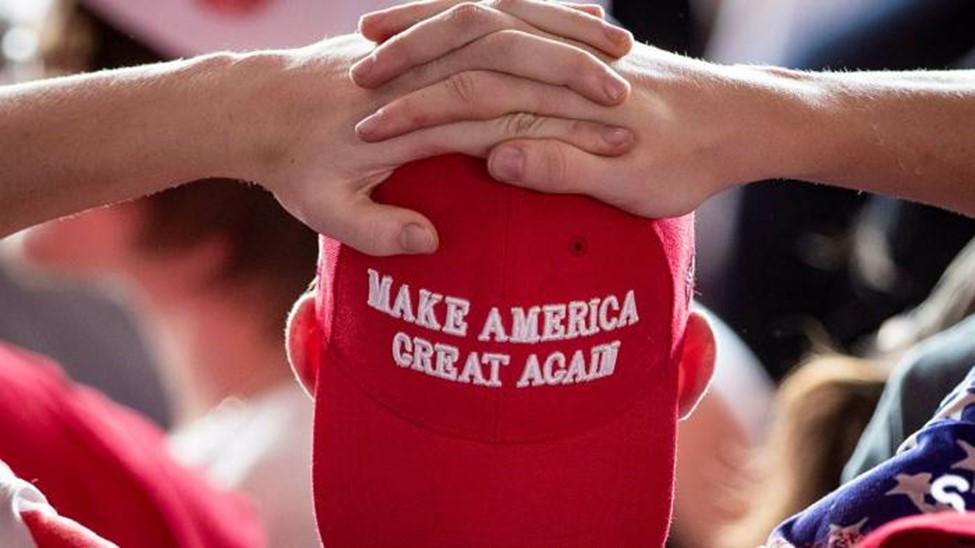
Chinese factory owners say they earn more money making pro-Trump products than Chinese flags or Biden campaign merchandise © Drew Angerer/Getty
Ryan Li does not have a vote in the US presidential election. But if he did and was voting with his wallet, he would support Donald Trump rather than his challenger Joe Biden.
Mr. Li, a manufacturer at the sprawling Yiwu International Trade Centre, a wholesale center in eastern Zhejiang province, has been turning down orders to make Chinese flags for the week-long National Day holiday. Instead, he has discovered there is more money to be made manufacturing merchandise for the US president’s supporters.
“I work for whoever offers the best terms,” said Mr. Li, who can charge Rmb5 (74 cents) per piece of Trump paraphernalia but gets only Rmb4.5 for each Chinese flag.
Mr. Li is one of a number of Chinese merchants profiting from making everything from hats to wristbands for the US presidential race. Many work with wholesalers that sell the unofficial goods at Trump rallies, online or to US retailers.
Given the rapid deterioration in Sino-US relations this year, and Mr. Trump’s targeting of China throughout his presidency, the campaign boom is probably the most ironic part of China’s export renaissance.
“China’s exports are recovering faster than people think,” said Larry Hu, an economist at Macquarie Group, the Australian bank. Chinese factories have in recent months reported a sharp rebound in orders from American buyers. Exports to the US surged 16 percent year on year in July and August, compared with an 11 percent drop in the first six months of 2020, according to official data.
Chinese manufacturers are able to offer Trump and Biden supporters low prices. Yiwu merchants will sell the “Make America Great Again” baseball caps for as little as 88 cents, generating a generous profit margin for US retailers that can charge $12 or more for each hat. The manufacturers in Yiwu make about $2 per hat.
“We cut prices by as much as possible so we won’t lose out to the thousand other competitors who make the same product,” said Wang Fuli, a hat merchant in Yiwu. She has generated a third of her sales from the Trump campaign since April, when the city’s famous market reopened following a two-month lockdown.
Jimmy Lin’s factory in Dongguan, a manufacturing hub in southern Guangdong province, has been badly hit by the coronavirus pandemic, with many of his US clients in arrears. But orders for campaign merchandise, which he began receiving in February, have helped keep him afloat.
Mr. Lin initially estimated that 70 percent of his US election merchandise sales, such as a banner emblazoned with the slogan “God, Guns & Trump”, were for Trump supporters.
“Market demand for Trump products is relatively better,” he said.
But although Mr. Lin recognizes Mr. Trump’s name in English, his grasp of the language is poor and he had assumed anything he produced with the president’s name on it was pro-Trump merchandise such as a flag that says “Anyone but Trump 2020”. Other products say “Impeach Trump: Make America Great Again” or “Pro America, Anti Trump”.
“I did not know that,” he said when the Financial Times pointed out that these were anti-Trump products.
In Guangzhou, Wang Bei’s struggling ZCT Industry luggage factory was about to go under in May when it switched to making campaign masks. Revenues have since doubled.
“Masks are much easier than luggage — we just needed to find the right fabric,” he said.
Initially, he did not have enough workers or sewing machines to meet soaring demand, but he was able to contract out his orders. “This is an industrial cluster,” he said. “At peak periods, more than a dozen factories helped us make masks. The co-operation among factories here is fantastic . . . We also supported nearby printing factories. Hundreds of workers were able to keep their jobs.”
ZCT Industry had more Trump orders at first, but Biden masks are making a comeback. “We sold more Biden than Trump masks over the last two months,” Mr. Wang said.
Similar economies of scale are at work in Yiwu. “It makes a difference paying your supplier one cent less per piece if you have a big enough order,” said Zhang Guolu, whose factory makes pro-Trump banners.
Xu Hongjie, another Yiwu factory owner who also made Trump banners for the 2016 campaign, said his profits are thinning. He charges Rmb6 per piece, the same price he received four years ago, even though his production costs have risen more than 25 percent during the course of Mr. Trump’s first term in office.
“We don’t have the pricing power,” admits Mr. Xu, who makes 20 cents in profit for every “Keep America Great” banner he sells. “All we can do is try to control costs.”
Another challenge is the tariffs Mr. Trump imposed on Chinese exports during his 18-month trade war, which were paused in January with a “phase 1” trade deal. Campaign-product exporters still face a punitive 25 percent tariff. Merchants in Yiwu canvassed by the FT said they were generally willing to absorb 5-10 percent of the extra cost.
The Chinese manufacturers also appreciate that US presidential campaigns that have proved such a financial boon do not last forever. “When will the election end?” asked Mr. Wang at ZCT Industry, worried he might be left with a big backlog of unsold products.
Source: The Financial Times, October 6, 2020 | Sun Yu in Yiwu, Qianer Liu in Shenzhen and Tom Mitchell in Singapore